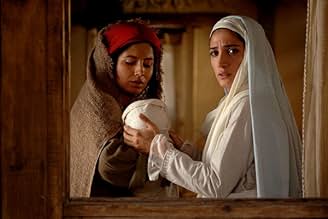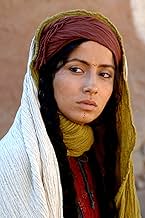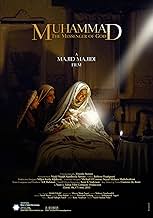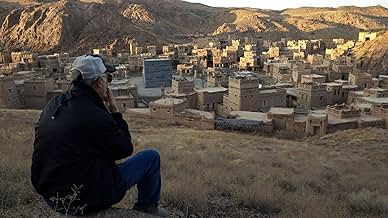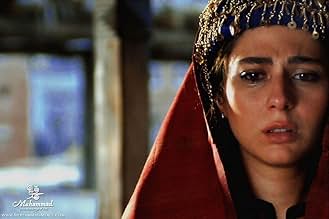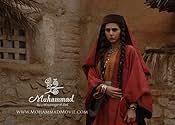AVALIAÇÃO DA IMDb
7,2/10
13 mil
SUA AVALIAÇÃO
Os eventos, acontecimentos, previsões e milagres em torno do nascimento e da infância do profeta Maomé.Os eventos, acontecimentos, previsões e milagres em torno do nascimento e da infância do profeta Maomé.Os eventos, acontecimentos, previsões e milagres em torno do nascimento e da infância do profeta Maomé.
- Direção
- Roteiristas
- Artistas
- Prêmios
- 1 vitória e 2 indicações no total
Baharak Salehniya
- Thowaiba
- (as Baharak Saleh Nia)
- Direção
- Roteiristas
- Elenco e equipe completos
- Produção, bilheteria e muito mais no IMDbPro
Avaliações em destaque
Majidi is a king within the realm of art film, and he sure faced immense challenges managing the first Iranian cinematic project of this scale. The film immerses the audience in an orchestra of beautiful colors, Majidi's specialty, and an outpouring of sublime tunes. Juxtaposed with masterful cinematography of Storaro (although occasionally overdone), Majidi delivers imagery that satisfies aesthetic palates superbly.
The historical period drama, said to be the first part of a trilogy, focuses on prophet Muhammad's childhood. It is of note that, the filmmaker, working within the confines of Islamic conventions, cannot show Muhammad's face, which undeniably renders the project formidable. Hence, the point of view must be shifted, the story must unfold from distributed viewpoints, that must gel together skillfully in order to retain coherence. Though the story does justice vis-à-vis this challenge, it is far from perfection; the script does not mesh well with the visual artistry. The second act is stale, and the last act, though adequate, could be substantially improved. The CGI was noticeably weak; understandable, since it was the very first experience Iranian cinema went through, but still, within the given bounds, could be trimmed down and could easily be improved significantly. This evinces an odd feature of this film: the sense of perfectionism in this film is oddly inconsistent; some parts are perfected masterfully with amazing care, and a few are not even average. In addition to the CGI, the voice of Muhammad is an illustrative example: letting alone professional actors, I am sure that even among Iranian children doing TV commercials there are who are by far better voice actors, both in terms of enunciation and acting, than the kid chosen in this film for the role of Muhammad. What happened to the sense of perfection of the whole team there, I am not sure.
The film strives towards Shia-Sunni neutrality, and succeeds remarkably---unless viewed with absolute cynicism (anything can be deemed as biased if viewed from that lens). The focus is predominantly on the commonalities of the Shia-Sunni accounts, and the chosen story time---Muhammad's childhood---is certainly helpful towards that end. All in all, the film can be best characterized as "promising" (especially when held against the technological status quo of the Iranian cinema) regarding the potentials of cinema for engendering harmony and peace in our ominous and volatile times. It is definitely a must-see.
The historical period drama, said to be the first part of a trilogy, focuses on prophet Muhammad's childhood. It is of note that, the filmmaker, working within the confines of Islamic conventions, cannot show Muhammad's face, which undeniably renders the project formidable. Hence, the point of view must be shifted, the story must unfold from distributed viewpoints, that must gel together skillfully in order to retain coherence. Though the story does justice vis-à-vis this challenge, it is far from perfection; the script does not mesh well with the visual artistry. The second act is stale, and the last act, though adequate, could be substantially improved. The CGI was noticeably weak; understandable, since it was the very first experience Iranian cinema went through, but still, within the given bounds, could be trimmed down and could easily be improved significantly. This evinces an odd feature of this film: the sense of perfectionism in this film is oddly inconsistent; some parts are perfected masterfully with amazing care, and a few are not even average. In addition to the CGI, the voice of Muhammad is an illustrative example: letting alone professional actors, I am sure that even among Iranian children doing TV commercials there are who are by far better voice actors, both in terms of enunciation and acting, than the kid chosen in this film for the role of Muhammad. What happened to the sense of perfection of the whole team there, I am not sure.
The film strives towards Shia-Sunni neutrality, and succeeds remarkably---unless viewed with absolute cynicism (anything can be deemed as biased if viewed from that lens). The focus is predominantly on the commonalities of the Shia-Sunni accounts, and the chosen story time---Muhammad's childhood---is certainly helpful towards that end. All in all, the film can be best characterized as "promising" (especially when held against the technological status quo of the Iranian cinema) regarding the potentials of cinema for engendering harmony and peace in our ominous and volatile times. It is definitely a must-see.
Muhammad: The Messenger of God (2015) is an Iranian film written and directed by Majid Majidi. Cinematography was by Vittorio Storaro. Dryden Theatre of Rochester's George Eastman Museum has been honoring Vittorio Storaro, and that's how we were able to to see this movie. (The DVD was Storaro's own personal copy.)
Another reviewer has called this film, "A must-see feast of beautiful colors and tunes." That is absolutely correct. The screen is filled with color and action. The music is beautiful. The acting is outstanding. (We are never shown Muhammad's face, out of respect for Islamic tradition.) We see elephants, camels, horses, and sheep. Director Majidi gives us (literally) a cast of thousands. The desert scenery is spectacular.
Everything works, except that the actual facts about Muhammad's childhood are scarce. Director Majidi concentrates on miracles that Muhammad performs as a child. I've read a fair amount about Islam, and I've never seen any emphasis placed on Muhammad having supernatural powers when he was young. Muhammad was an orphan, and his life was challenging. Some of what was shown is probably historically correct, but I think most of it arose in the mind of writer Majidi.
One major problem for me is that the film is virulently anti-Semitic. As I understand it, Jews weren't involved in Muhammad's life. He accepted the God of Abraham, and he is considered by Muslims to be that God's true and last prophet. However, any violence he encountered was from opposing tribes, not from Jews. Maybe director Majidi is anti-Semitic. My guess is that this was the price he had to pay for the freedom to make this film in Iran.
The movie is three hours long. The good news is that it was never boring. The bad news is that it may have only a tangential bearing on the life of the Prophet Muhammad.
Another reviewer has called this film, "A must-see feast of beautiful colors and tunes." That is absolutely correct. The screen is filled with color and action. The music is beautiful. The acting is outstanding. (We are never shown Muhammad's face, out of respect for Islamic tradition.) We see elephants, camels, horses, and sheep. Director Majidi gives us (literally) a cast of thousands. The desert scenery is spectacular.
Everything works, except that the actual facts about Muhammad's childhood are scarce. Director Majidi concentrates on miracles that Muhammad performs as a child. I've read a fair amount about Islam, and I've never seen any emphasis placed on Muhammad having supernatural powers when he was young. Muhammad was an orphan, and his life was challenging. Some of what was shown is probably historically correct, but I think most of it arose in the mind of writer Majidi.
One major problem for me is that the film is virulently anti-Semitic. As I understand it, Jews weren't involved in Muhammad's life. He accepted the God of Abraham, and he is considered by Muslims to be that God's true and last prophet. However, any violence he encountered was from opposing tribes, not from Jews. Maybe director Majidi is anti-Semitic. My guess is that this was the price he had to pay for the freedom to make this film in Iran.
The movie is three hours long. The good news is that it was never boring. The bad news is that it may have only a tangential bearing on the life of the Prophet Muhammad.
This movie is in a class of its own. It is a feast for the senses: like a work of art, a painting, or a poem. It is a gentle breeze of fresh air, in a lonely, nonspiritual world. Unlike anything I had experienced before, in the venue in which I saw the film, the majority of viewers broke down in tears of awe at least once during the showing. You could see people shed tears all around. One lady nearby let out whimpers all along, as the film was just too strong for her to control her emotions. Amazing. Just a note for the producers if they ever read this: I wish that after all 3 parts are released, the entire trilogy is shortened into one single film for those who do not have the patience to sit through a 10 hour marathon (of all 3 parts). I think for an impatient viewer, joining all 3 parts into a 2-3 hour movie would be an excellent fit.
Beautiful movie.
A story of love and pain,of hope and fear,of life and death and of family,it's values and traditions.
The creator of this universe protected the Prophet Muhammad (PBUH) from the early childhood.
In this movie young Prophet Muhammad (PBUH) is shown minus his face,that point could create some controversy.So be aware of this fact before watching the movie.
I do cry at few occasions and smile when the small kid was named as "Muhammad"(PBUH).
This film can only be seen by letting go of our logical mind that tries to analyze characters or look for suspense. If you allow your emotions to conduct you, then this film will fulfill you. It's a film that calls on you senses. The vision of beauty, the magical sounds, the loving caress of hands, and even the smell. If smell is one sense that is not yet stimulated in a theater, in this film the evocation is so strong that you smell the sand, the wind, the sea and the perfume of the roses. For Majidi the beauty of the nature and the love between people are the only path to God. Muhammad is an ode to an orphan who had a deep connection with Nature and its Master and became the leader of new religion.
Você sabia?
- CuriosidadesThis movie will be part of a trilogy. Muhammad will never be shown in any of the three films for the respect of his character. This is specifically done in all media in Islam countries to avoid idolization of a renown character to an actor's face. Instead, he is meant to be known by his religious and historical personality profile.
- Citações
Abdul Muttalib: There is nothing futile in the sight of God.
Principais escolhas
Faça login para avaliar e ver a lista de recomendações personalizadas
- How long is Muhammad: The Messenger of God?Fornecido pela Alexa
Detalhes
- Data de lançamento
- País de origem
- Centrais de atendimento oficiais
- Idiomas
- Também conhecido como
- Muhammad: The Messenger of God
- Locações de filme
- Empresa de produção
- Consulte mais créditos da empresa na IMDbPro
Bilheteria
- Orçamento
- IRR 120.000.000.000 (estimativa)
- Faturamento bruto mundial
- US$ 1.440.044
- Tempo de duração2 horas 42 minutos
- Cor
- Mixagem de som
- Proporção
- 2.00 : 1
Contribua para esta página
Sugerir uma alteração ou adicionar conteúdo ausente



